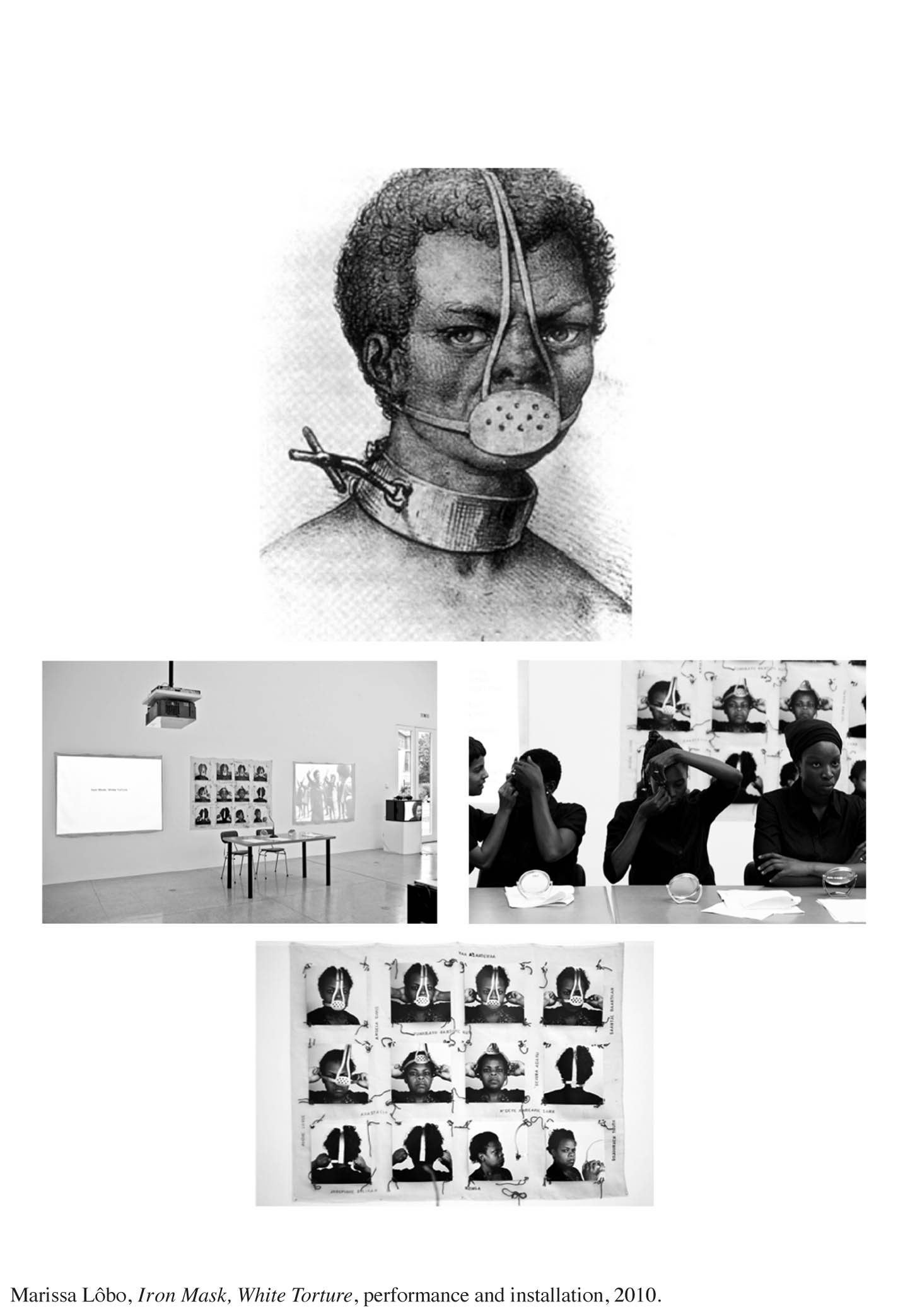Some very recent examples of artistic interventionist practices
In the following I describe four examples of artistic interventionist practices in Austria, beginning with one in greater length. If I talk of very recent artistic practices then we have to name Marissa Lôbo, born in Brazil, who lives and works in Austria and is a black activist and a member of MAIZ. One of Lôbo’s most impressive projects is Iron Mask, White Torture, a performance and installation that was presented as part of the group exhibition “Where do we go from here?” presenting new positions from Austria and Central Europe at the Secession in Vienna in 2010. After the opening of the show an article was published in the main daily newspaper Der Standard in which not a single word was written about Marissa Lôbo’s performance Iron Mask, White Torture. This omission is very telling and disturbing alike as the performance consisted of nine Black women and Women of Color, wearing black outfits and having bright blue eyes. The blue eye represented a reference to Anastácia, a slave in Quilombo region in Brazil, whose struggle for freedom became the symbol of anti-colonial resistance. Performers in the project were Agnes Achola, Alessandra Klimpel, Belinda Kazeem, Flavia Inkiru, Grace Latigo, Steaze, Sheri Avraham, Njideka Stephanie Iroh, and Marissa Lôbo. The performance was impossible to miss at the opening of the exhibition!
The curator chose the title “Where do we go from here?” for the group show. The question “Where do we go from here, Vienna?” was commented on by Marissa Lôbo and Sheri Avraham as an ironic question to be asked when as they stated “your history is imprinted in every corner, and at the same time we revile openly and legally a deep-rooted racist structure” (Lôbo 2013: 272). (*2) They commented on a recent Austrian election campaign, in which legislation was discussed that would enforce laws imposed on those defined as “aliens,” citing those coming from non-EU countries (Lôbo 2013: 272).
(*2) They commented on a recent Austrian election campaign, in which legislation was discussed that would enforce laws imposed on those defined as “aliens,” citing those coming from non-EU countries (Lôbo 2013: 272). (*2) Lôbo refers to the parliamentary elections in Austria in 2008 and to the subsequent reinforcement following the major amendments to the “Aliens Act” and the Asylum Law in Austria adopted in 2002.
(*2) Lôbo refers to the parliamentary elections in Austria in 2008 and to the subsequent reinforcement following the major amendments to the “Aliens Act” and the Asylum Law in Austria adopted in 2002.
I will now describe the performance in detail and make a direct reference to a text presented online:*11 *(11) One long empty table is slowly occupied by nine Black women and Women of Color. They sit next to each other and stare directly at the audience. The group articulates and gives voice to all objects exhibited in art museums that have been object of theft, violence, lies, and silence. The reading starts with a repetition of the name Anastácia by each of the nine performers. Then each woman, one after the other, firmly exposes thoughts by Black feminists. Thoughts that concern racism and sexism, African Diasporas, Black identities and colonization are juxtaposed with critical migration politics and with “rethinking Black feminism as a social justice project.” In the last minute of the performance they take out the blue eye lenses and leave the space — some applause comes from the audience. This applause can be understood as a violent moment of contemplation on the art work, and the strong voice by Grace Latigo asks “Is there something to be applauded here?” Not to forget the question that does not want to be silent: “Where do we go from here?” “Nowhere! – We are here to stay!”
The project and performance are important as they develop a relation to the role of “empowerment,” “agency,” and “choice” in terms of who speaks and the role of epistemology as well as the role of art institutions, such as galleries, museums, etc.
Marina Gržinić ( 2014): Dissident feminisms, anti-racist politics and artistic interventionist practices. In: p/art/icipate – Kultur aktiv gestalten # 04 , https://www.p-art-icipate.net/dissident-feminisms-anti-racist-politics-and-artistic-interventionist-practices/




 Artikel drucken
Artikel drucken